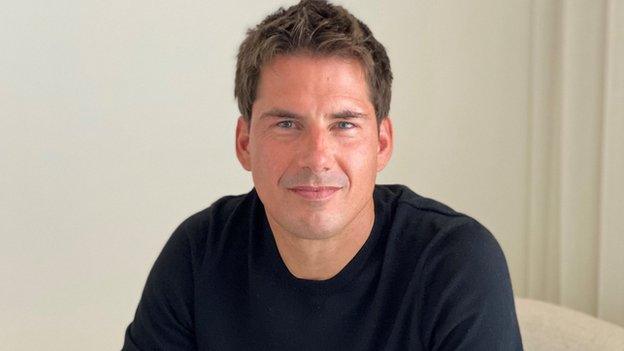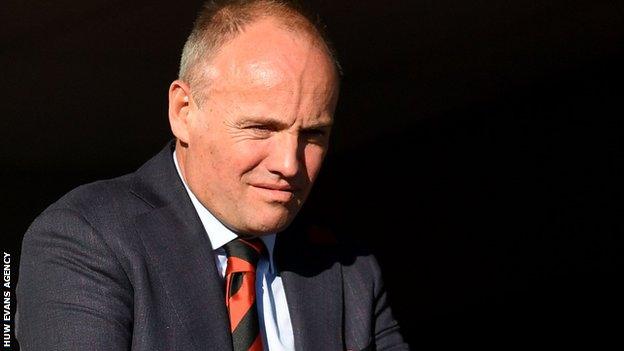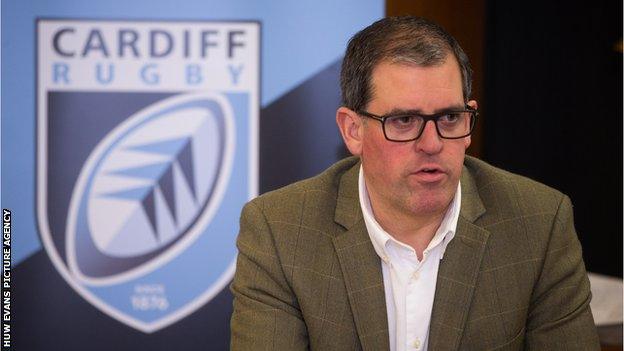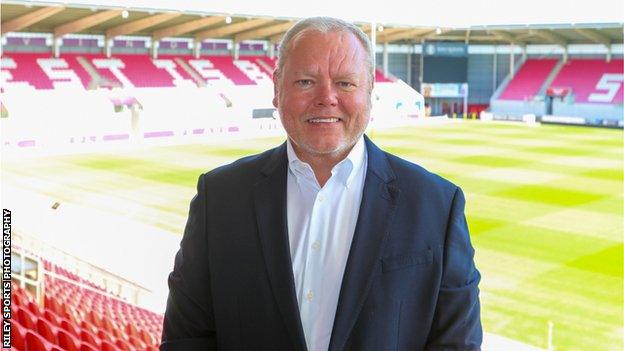United Rugby Championship: Welsh rugby prepares itself for new tournament era
- Published
United Rugby Championship: Scrum V Live's Gabby Logan explains how competition will work
Welsh regional rugby will be hoping for a successful new era when the new-look United Rugby Championship (URC) kicks off this weekend.
Scarlets were the last Welsh side to win a version of this tournament in 2017, with Irish province Leinster dominating the competition since then.
The four former South African Super Rugby sides have joined what had been the Pro14 to increase the number of teams to 16, drawn from five rugby nations.
While there will be one league with the top eight qualifying for end-of-season play-offs there will still be a local rivalry element.
Dragons, Ospreys, Cardiff and Scarlets will be battling to be the top region to win the Welsh shield trophy and clinch Heineken Champions Cup qualification.
The URC, headed by chief executive Martin Anayi, claims the revamped tournament will see the top stars play more regularly with no matches organised on international weekends.
BBC Sport sat down with Ospreys chief executive Nick Garcia, Dragons chairman David Buttress, Scarlets executive chairman Simon Muderack and Cardiff Rugby chief executive Richard Holland to discuss the season ahead.
What are the ambitions for your region this season?
Ospreys' Nick Garcia: It's an interesting one because as Y11 (Sports and Media), the Ospreys owners, this is our first real season and it's exciting to have fans back.
We're going to start rolling out a business plan and we do a lot of stuff on the virtual circle of sport.
Winning is critical for us first and foremost. We've had Toby (Booth, Ospreys head coach) in, bolstered him with a performance director in Corin Palmer; they're a good team together and we'll continue to invest in that side of the business by recruiting players.

Ospreys announced former Manchester City executive Nick Garcia as their new chief executive in March 2021
We've invested in a complete overhaul of our high performance centre which gives us the facility size for the squad we've got.
You have two things in sports organisations: the people and the brand, which we're investing heavily in.
We've got a vision going forward with a narrative true to our roots and where we've come from.
I've come from 25 years commercial side of sport and there's a huge opportunity to do proper strategic propositions to our partners, where we can show the return they're getting on their investment and work closely with them.
So you invest in talent on the pitch and make your product good off it.
You then use the winning to get fans, who bring in money, the money goes back into the players who create more winning. More fans, more money etc. This is how we're structuring everything.
This season is the journey beginning, we're planning three years ahead.
We had some small success last season and it's growing. We're excited about where it's going and have a clear path.
Dragons' David Buttress: Our narrative hasn't changed, we're trying to build something long-term. We try to invest in a sustainable way to build local players and talent out of Gwent, we've started to see that at play a bit over the last 12 months into the Welsh squad which is great for the team. Hopefully it incrementally improves.
We've been steadily more competitive, won more games last year and the year before than we've won in the previous five years.
We're doing two things as our prime objective: producing more talented boys that can represent our region and play for Wales, and secondly become more competitive in the league. It's as straightforward as that.
There is probably a softer thing about bringing people back into sport, whether it's players or supporters. I'm conscious we've had 18 months of Covid, so what matters around here is we all love and enjoy rugby.
We've got to grow the product, whether it's people coming though the turnstiles, while being back on free-to-air (television) is also a great thing.

Former Just Eat boss David Buttress became Dragons chairman in September 2017
Cardiff's Richard Holland: We're embarking on a new journey under the name Cardiff Rugby. On the field we are under the steerage of (head coach) Dai Young and a three-year programme he's implementing.
In terms of our playing side of things it's well documented we haven't added huge numbers to our roster, only a couple of changes.
On the coaching side we have strengthened and want to build on the seventh places we've seemed to have had over previous years.
We've got a minimum objective of qualifying out of the tournament and continuing in the Heineken Cup.
We accept we've got some tough competition, which is always a good thing, but need to be realistic where we sit in that competitive level also.
Another big thing we are embarking on are new training facilities, so we hope at some point this year to be putting the spade into the ground.
We're working with Cardiff Council to deliver that and it will be one of the best facilities in the UK, if not European rugby, and we're finalising those plans. So we've lots to be excited about.
Scarlets' Simon Muderack: This almost feel like my first full season. The closest I have come to crowds is the Nottingham pre-season friendly game.
On the field last year was very disappointing for us. We have made a number of alterations to the coaching set-up and the environment.
We have said goodbye to 17 members of the squad and brought in about five to strengthen in key positions.
We have set higher standards from a performance perspective. The sentiment from the squad is we are looking to deliver a different set of outcomes on the field this season.
There are still some sceptics surrounding this competition, so how would you convince them to turn up and watch games?
NG: The talent on show is a big thing. Wales are the Six Nations champions and you also have world champion and (British and Irish) Lions players in our league.
That's hugely exciting, as is the format of two hemispheres and five rugby nations with the big four South African teams coming in. There are about 250,000 South Africans living in London who can come down to support their teams.
We are also not losing the Welsh derby matches which is vital and we begin at home against Cardiff Rugby.
The TV deals done by URC, with 75% of regions' games on free-to-air, is huge for the sport. Those kind of 'flirt fans' as we used to call them in football - floating fans if you like - you can pull them in easier and we can start developing them through a fun experience.
Fans are critical to us and we've got to create an incredible matchday experience with more accessible tickets and a big push to the under-25s and student markets. We want to get that stadium full and create more atmosphere.
DB: There is nothing like live sport in Wales. I would reach out to people and say "we want you back", after we have all worked hard to get the product back on the road. And I think it's a great product now.
In the three years I've been involved, this is the most exciting time in terms of the league. If I look at the URC, the branding under Roc Nation has become cool, my kids like it, that's always a good test.
The second thing is the quality of the teams. If you look down the fixture list there's some good matches and not just the Welsh derbies.
There's some tough games throughout the season, hopefully supporters are as excited about that as I am and I'm looking forward to welcoming the best of South Africa.
The derby element remains and with the leading Welsh side qualifying for the Champions Cup, there is jeopardy in this league all over the place now. There is a lot hanging on every game.
The best players are available more than ever, we will see more of them week in week out - but we can do better on that front.
If we could get them on the field every week we know we have a great product. It is not just the Welsh internationals, every weekend we can see some of the best players in the world on our fields.
So I would encourage everybody to give it a try.

Richard Holland succeeded ex-Wales and Lions lock Robert Norster as chief executive at Cardiff Arms Park
RH: Dai has come in and is trying to deliver a brand of exciting rugby which we hope attracts supporters.
We have the unique position in Cardiff where the stadium is in the heart of the city. It's also about coming in for an afternoon or evening's entertainment and experiencing the buzz the city generates on match day.
The league is a fantastic product. It's a big opportunity to see the big South African sides and that is worth it in itself.
We will continue to look forward to the big derbies against our Welsh colleagues. It's got a bit of added spice this coming season in terms of the Welsh shield, with four of us going up against each other for those Heineken Cup spots. It is a bit of a sub-plot to the main tournament.
So there are gloating rights but also the European qualification that comes with it. We are friends off the field but want to beat each other on it.
The most important thing is we want the supporters back because spending a season without them was a pretty odd place to be.
They make the difference. You just have to speak to the players and coaches who thrive on the atmosphere they help create.
SM: We are going to have to work hard, as all sports are, to get crowds back in. Some people are still fearful and others have found other things to do with their lives, and we need to provide a family-friendly environment.
We are focused on delivering a high-quality product on the field that is appealing to fans. Jeopardy is important and the clarity of the latter format is good because it used to confuse me in the past.
We have to embrace the league and make it as successful as we possibly can. Four new South African teams all bring a bit of spice and a new tv deal with that free-to-air component is massive.
The key is for the best players to be playing in our league games. The URC structure progresses us massively towards that goal.
It is still not perfect this season, that is a factor of the global calendar, but we need to continue to work on that. If you look at the nations that supply the teams in this league, the quality of player is there.
If we can consistently get that talent playing for all of our teams, there is every opportunity for this competition to be among the very top leagues across the world.
We all pay the cheques of some of the best players on the planet and want to make sure they are delivering performances for us every week.
Credit to the league, a lot has been achieved over the last 18 months despite Covid-19. The CVC deal was closed, we have reconstituted a new league and brand which has a different look, and like David I feel my kids relate to it. That is important.

Simon Muderack replaced former Scarlets chairman Nigel Short in 2020
How are the regions going to cope financially following the effects of Covid-19?
NG: We are taking a long-term view so we are investing early on the pitch and will continue to do that. Critically we are investing in sustainability drivers, having a stronger commercial proposition so we can get more revenue and better fan proposition so we can fill the stadium more.
It's been a brutal 18 months and I have never seen the Ospreys play with a crowd. It's been horrific for the fans and we are excited to get them back in.
I see this as a new era for the Ospreys and Welsh rugby. The four of us talk a lot with the WRU (Welsh Rugby Union). It's going to be tough and going to take time but we will always improve.
We are in Europe now, we need to stay in Europe and keep climbing. That is the reality to stay relevant. Most importantly we all need the fans behind us, otherwise nobody is going anywhere.
DB: I think our fans are bored to death with Welsh rugby talking about the finances. They want to come back and watch the rugby. Frankly I don't blame them.
The stuff about finance should be dealt with off the field and confidentially behind closed doors. I can't think of any other business in the world that talks so openly about its finances than professional rugby in Wales.
I don't think the fans care, they want us to do a good job, take care of teams we are responsible for and make sure the product is good and keep the finances stuff separate in the Welsh rugby boardrooms.
We need to talk about it less in the press because it's not constructive.
That said, we all understand we are in a professional sport model and in Wales we are interdependent. We need the WRU and four regions to work together and support each other financially.
We have learned that over an extremely tough 12 months. There is no Welsh national team without the supply from the professional game and vice versa.
RH: I would echo David's sentiments and don't want to touch much on the finances. We want to focus on getting the rugby started. There is always talk of finances around boardroom tables, that is where it should remain.
We are seeing encouraging signs on the commercial side and put that down to the new tournament and our rebrand.
We have already seen the encouraging 35% uplift on new season memberships coming on board. We have, though, had some challenges in trying to put confidence in a certain demographic of our members returning because of Covid-19.
The main priority for everybody was to try and navigate through one of the worst crises to hit the planet. We are all here, entering a new season in a positive mindset and excited to see the journey on the field.
The biggest factor of getting people through the gates is winning. If we can do that, have some success, we can continue in that positive light.
SM: There is a sub-set of the fandom that does like to ask us constantly about funding and it is important to the game. Will we continue to arm-wrestle with the WRU? Yes we will, that will happen in perpetuity in some shape or form.
We have some traditional battles we will continue to fight but we have made good progress on a number of fronts.
It's incumbent on us to do a better job of running our own businesses more successfully. That is not meant to be critical but we all have growth opportunities.
At a macro league level, there is a significant amount of opportunity in the club game. Martin (Anayi) and his team have worked hard to drive that up and we are already starting to benefit from this season financially.
As the league continues to grow and go through this 10-year journey we expect, as our CVC investment partners do, to see significant growth in the commercial opportunities for the league.
It is incumbent on us, though, to pursue our own growth as well as supporting Martin and the league and play our part in growing the club game.
Nick made a good point about the Ospreys being on a three-year journey and we are all really on a 10-year journey.
With private equity coming into the sport, we are going into an interesting decade of change. We all recognise that and see the opportunities and challenges. We need to embrace that.
*The URC kick-offs on Friday night at 19:35 BST with Cardiff v Connacht live on Scrum V on BBC Two Wales and online, plus audio commentary on BBC Radio Wales, the BBC Sport website & app.
Watch highlights of the opening weekend on Scrum V on Sunday, BBC Two Wales and online from18:00 BST and afterwards on demand.